The Best FREE Google Project Management Apps Out There
— March 13, 2019
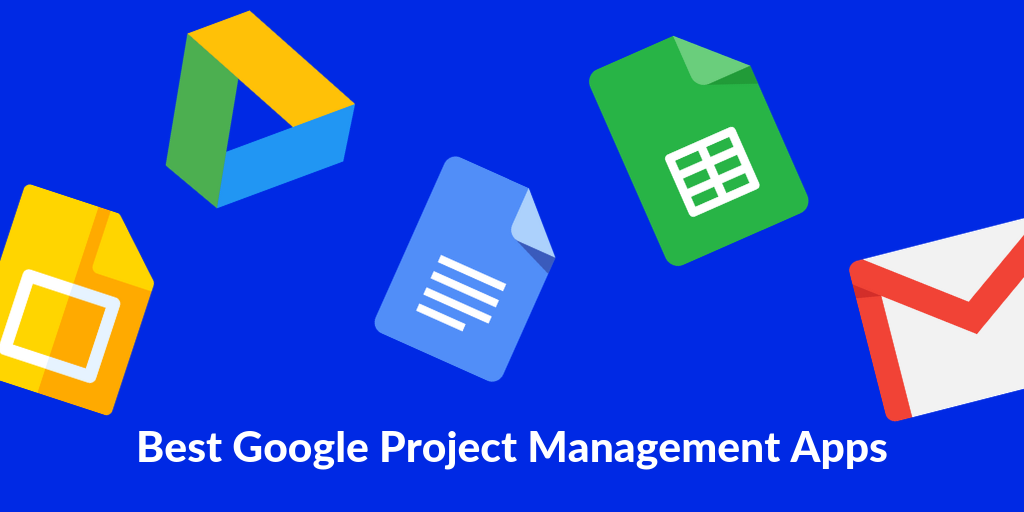
To succeed as a modern marketing project manager, you and your team must effectively employ a range of tools. Wondering how the suite of free apps from Google measure up? Here’s a deep dive into ways to make these tools work for you and your team.
5 Must-Have Features of Project Management Software
As a project manager, you know that the best pieces of project management software must tick off a range of boxes. Here’s a closer look:
1. Project Planning
In the digital age, you need a tool that can help you harmonize a remote and multidisciplinary team. In other words, to keep the project on track, you need to maintain a transparent project overview, assign tasks, and keep everyone updated.
This tool needs to operate in a way that everyone can understand at a glance. To guarantee an effective and logical workflow that eliminates missed steps, each member needs to receive the right tasks at the right times. Remember, one forgotten task can make the whole project stall.
2. Document Management
Accurate version control and document management are essential in the digital age. When your project files are accessed by different people at different times, everybody needs to have the correct permissions and understand where they should work.
Poor document management can lead to huge headaches. Work might get lost, or some team members may work on the wrong version of a document. You need a tool that literally keeps everybody on the same page.
3. Team Collaboration & Communication
Teamwork makes the dream work. Without a tool that offers effective communication, your creative team will become a collection of disparate individuals who find it impossible to work in harmony. This tool can have a significant impact on the quality of your project, the happiness of your team, and your ability to hit deadlines.
To keep conversations on-topic, you need to offer simple, well-organized tools for collaboration and communication. Without these tools, teams can waste countless hours trawling through old email threads and conversations to find certain directions or files.
4. Productivity Tracking
As a project manager, you walk the line between talented creative and rigorous manager. You are responsible for accurate billing, and there’s a very fine line between a profitable and unprofitable project.
If you’re not able to track your team’s time, you will never be able to authoritatively say whether a project is profitable or unprofitable. Without the data to evidence the work of your team, you’ll also find that billing becomes a nightmare. And when you need to provide a detailed analysis to your internal and external stakeholders, you’ll be left empty-handed.
5. Reporting & Progress Tracking
Once all of the above elements are in place, you have to carefully monitor the given project. You need a tool that can regularly offer you a detailed analysis into the speed at which your team is working, including the places where bottlenecks may appear.
Without the ability to carefully monitor your project, you’ll find that your team operates in the dark. Rather than being able to predict and prevent issues, you’ll only run into them when they unexpectedly appear. This handicap can cause stressful situations, create conflict among your team, and impact the quality and timeliness of your project.
Best Google Project Management Software
1. Google Sheets for Project Management
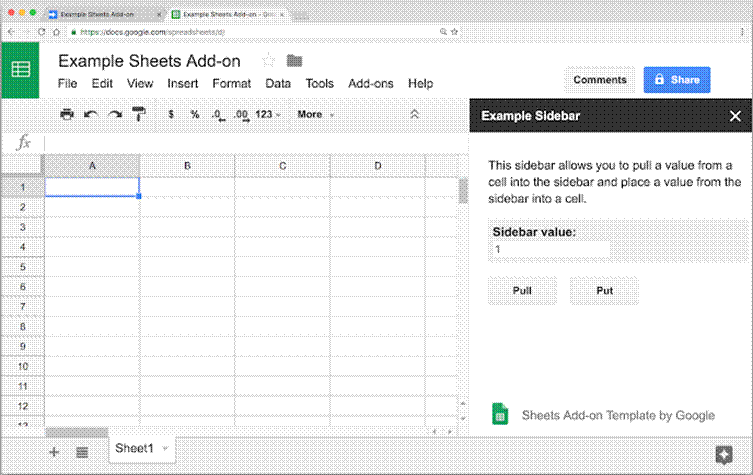
Google Sheets is a spreadsheet program that is an essential part of the Google Drive office suite. It can be used as a web or mobile application, or even as a desktop application (if you’re using Google’s ChromeOS). The app offers your team real-time editing and collaboration.
Project Planning
Google Sheets is compatible with Microsoft Excel, and it offers a lot of the same functionality. Therefore, it is an effective tool to create detailed project plans and lists of tasks, and it can act as a common space that allows your team to stay on top of the project.
Productivity Tracking
Your team can use a shared Google Sheet file to input the amount of time they’ve spent on a particular project. Using sophisticated calculations and formulas, you’ll be able to collate this information and get a detailed look at your budget.
Reporting & Progress Tracking
To automatically maintain a percentage progress bar, you can configure your Google Sheets file based on information provided by the team. Then you’ll have a good idea about the way the project is moving along. It’s also a simple way to export reports and share progress with stakeholders.
Bonus Resources
Google maintains a rich Learning Center that can help you hone your skills and maximize its suite of applications. This Google Sheets course helps you create dynamic plans that can be used to help you effectively manage your project.
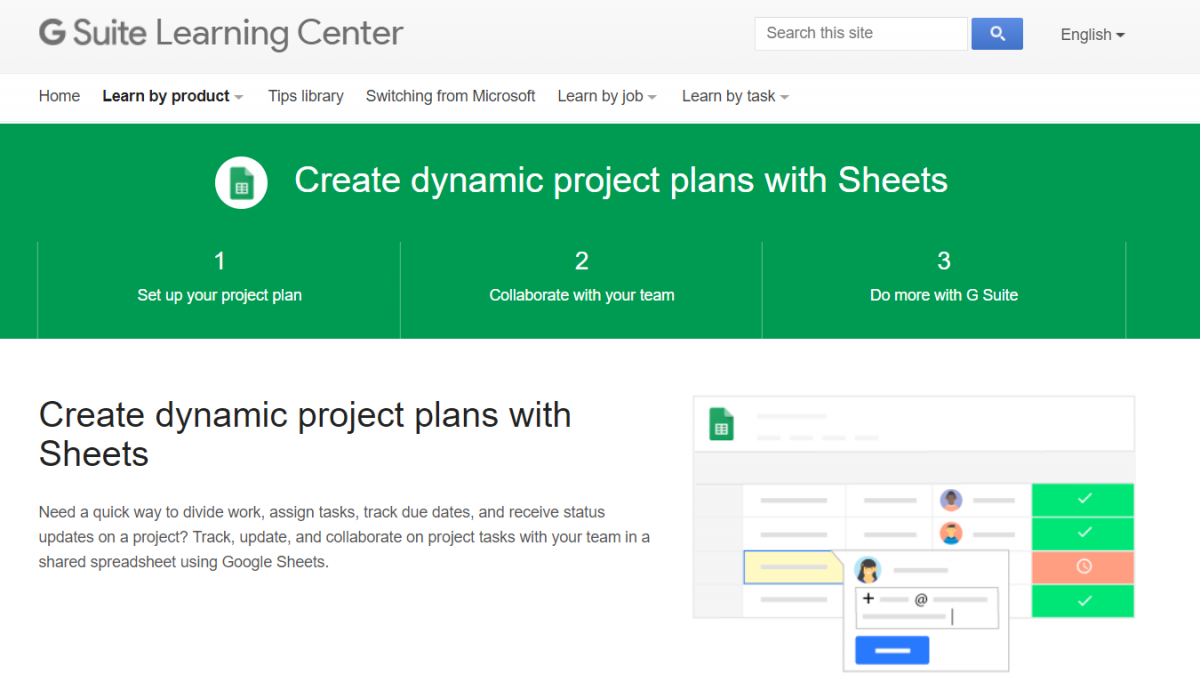
And here’s a great compilation of Google Sheets every marketing project manager will love:
2. Google Docs for Project Management
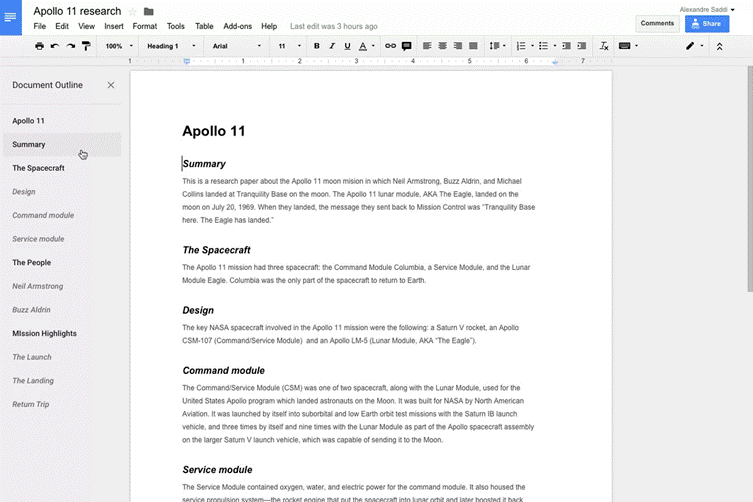
Google Docs is a word-processing tool that creates part of the Google Drive office suite. Again, this tool can be accessed on both mobiles and desktops, and it allows users to write and edit together. Google Docs makes version control a breeze, and it helps everyone share their thoughts about a piece of text.
Document Management
Editing copy can be difficult. A range of stakeholders has to be involved to ensure the text is accurate and on-brand. In the past, documents were distributed among the team, so it was common to see file names such as “Copy_Final_Revised_(2)”. It was a nightmare.
Google Docs makes document management simple, thanks to its intelligent version control. Each time a significant edit is made to a document, it’s easy to see who made the change, and when it was made. It’s also very simple to revert back to a previous version.
Team Collaboration
Google Docs makes collaboration simple. The days are gone when you had to download a document every time you got an email. Today, the entire team can comment, suggest, and edit in real-time, in order to make collaboration both efficient and transparent.
Bonus Resources
Of course, you don’t have to build every project-related document from scratch. Instead, here’s a list of ready-to-use Google Docs for your projects:
3. Google Drive for Project Management
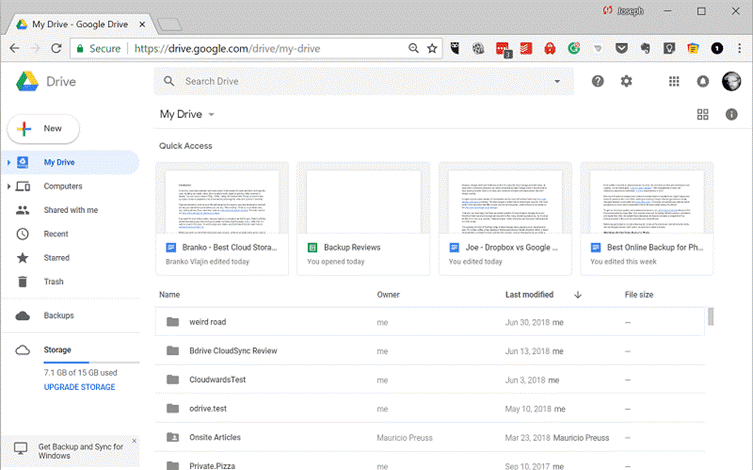
Google Drive offers your team a safe place to store any type of project file. These files are easy to organize into folders, and they can be accessed from a range of devices. Best of all, it’s easy to share these documents and collaborate on them.
Document Management
As a marketing project manager, you must make sure everyone has the correct access to a document. You must also ensure these files are logically organized.
Google Drive makes document management simple, and gives you the power to organize files and make sure version control is in place.
Team Collaboration & Communication
With Google Drive, you’re able to share documents with external stakeholders outside your team, get their feedback, and incorporate it into the next round of edits.
Now it’s simple to share comments and feedback, which will help encourage collaboration, make your projects more efficient, and boost the quality of the final polished product.
4. Google Slides for Project Management
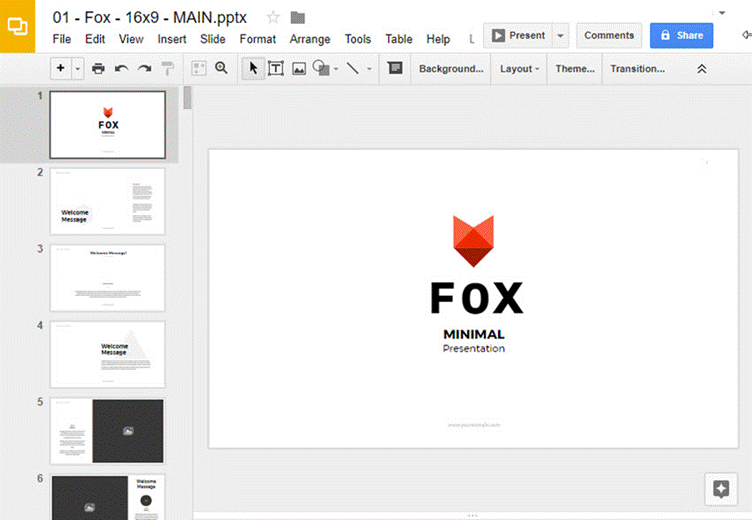
Google Slides is the third main tool in the Google Drive suite. It gives you and your team the ability to create stunning presentations that are compatible with PowerPoint. Marketing project managers can also use it to share clear, detailed project overviews.
Team Collaboration & Communication
A clear project overview is essential for succeeding at any project. As a project manager, you have a privileged view of the project, which includes the way you’ll deploy resources, the milestones you’ll need to hit, and the way your team will work.
Google Slides can be a very useful way to share your vision of the project with the team. In order to make sure your presentation is a reference tool for the team throughout the entire project, you can include timelines and critical project information.
Naturally, there are a range of downsides to using this approach, so you should investigate viable alternatives (if the scale of your project demands it).
5. Google Calendar for Project Management
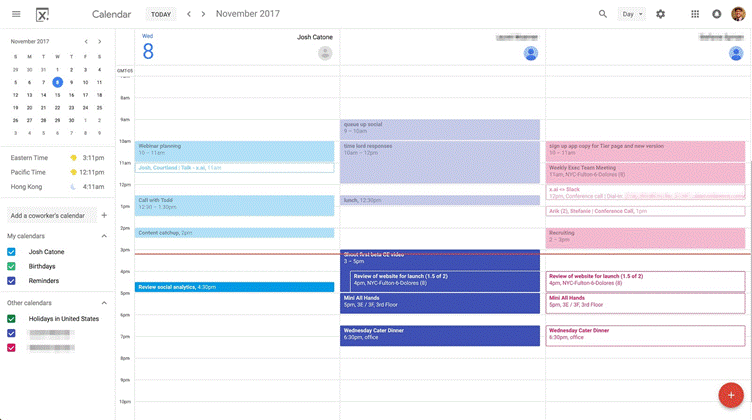
Over the last 12 years, Google Calendar has continuously been polished. It’s a popular time-management and scheduling tool that can be used by marketing project managers to create and edit events and reminders that keep projects on track. This calendar can then be accessed from a range of devices.
Team Collaboration & Communication
If your project is going to be successful, your team needs to work in harmony. In other words, everyone needs to be aware of key milestones and meetings.
Google Calendar is integrated with Gmail, which makes it easy to dispatch invites and schedule reminders for both internal and external stakeholders. You can also include a wealth of information in the invite, and you can rest assured that invitees can access this information on a wide range of devices.
It’s also simple to attach links to files within the Google Suite, which keeps everybody updated via one suite of tools.
6. Google Keep for Project Management
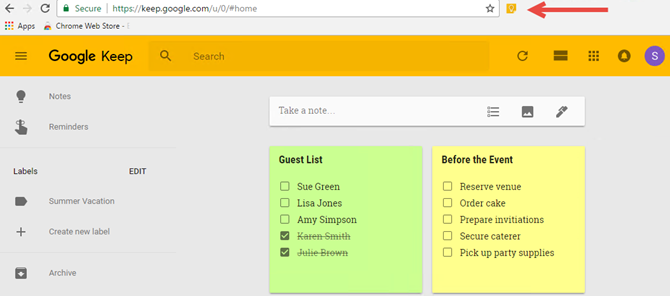
Google Keep is one of Google’s lesser-known services, but it can be a useful note-taking service (if used properly). You’ll find a range of ways to take notes, including regular text, bulleted lists, images, and audio. All of these methods can be shared with your team.
Team Management
A key strength of Google Keep is its cross-platform accessibility. In other words, your team can access this platform from a range of platforms, and you can use it to create simple project management lists.
This tool isn’t very sophisticated, but it is simple to use and has some nice features. The lists you create can be color-coded, and reminders can be associated with each one to make sure nothing is ever missed. The collaboration tool makes it simple to share task lists with your team, who can then interact with the checklist.
If you’re looking for a simple tool that offers quick checklists, Keep could be a viable option for your team. But if you need a more sophisticated tool, you ’ll want to explore some of the task-management solutions with more features.
7. Google Chat for Project Management
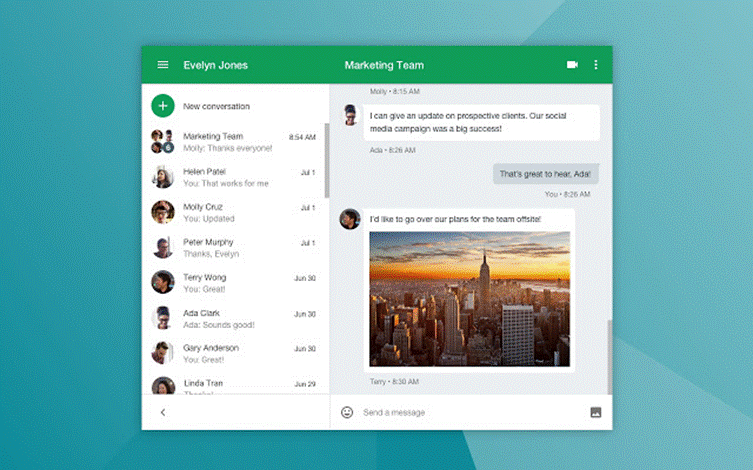
Google Chat is a free communication platform that accommodates messaging, video chat, and VOIP. It was released to replace three previous services, including Google Talk, Huddle, and Hangouts. Its future is still uncertain, and Google plans to divide the service into “Hangouts Meet” (aimed at video conferences) and “Hangouts Chat” (aimed at instant messaging).
Team Collaboration & Communication
To keep in touch and effectively collaborate, your team needs a reliable, feature-rich communication tool. A conversation that might have required an email or call in the past can now be quickly and efficiently resolved with a real-time chat tool.
Hangouts makes it easy for individuals or groups to chat on a range of devices. Text and video communication are simple, but there is some confusion about the desktop application and in-browser plugins, which can lead to compatibility issues. In addition, it looks as though Google is still trying to resolve a host of issues with its chat app.
Many organizations may find that team members naturally gravitate toward more popular alternatives, such as Skype or Slack.
8. Gmail for Project Management
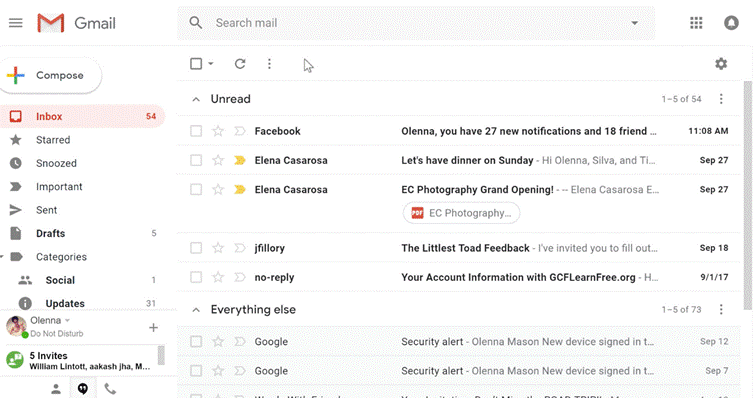
Internationally, Gmail has way over one billion active users, which makes it one of the world’s most popular email services. It can be accessed on both desktop and mobile through a variety of third-party programs. With a generous 15 gigabytes of storage per inbox, it’s the go-to choice for many creative teams.
Team Collaboration & Communication
Over the course of the project, your team needs to keep in touch and communicate important developments. Sometimes, instant messaging won’t cut it, so you need to share complex information with a range of stakeholders.
Gmail offers a simple, free, popular choice and seamless integration with the rest of the Google Suite, which helps you share project files and keep the entire team in the loop. Compared to alternative email services, Google offers large volumes of storage space, as well as the ability to send emails of up to 25 megabytes.
Is It Possible to Use Google for Project Management?
Project Planning
When it comes to project planning and task management, the Google Suite offers a few basic options. You might find that Google Sheets and Google Keep can meet some basic needs, but the suite doesn’t really accommodate for the complex project planning that other tools can.
Document Management
When it comes to document management, Google Drive really shines. While it requires some manual planning and management, you’ll be able to easily access all the functionality you need to keep things organized, and your project will move along efficiently.
Team Collaboration & Communication
Between its real-time editing functionality and Hangouts application, marketing project managers find they are well-served by the Google Suite. The team can easily keep in touch via email and chat, while editing and commenting on a range of documents.
Productivity Tracking
Google Sheets is a sophisticated application, and your level of ability will determine how useful it is as a time-tracking system. While this process is primarily manual, you may find that Google Sheets is a serviceable option for your particular needs.
Reporting & Progress Tracking
Again, the potential of the Google Suite in this area largely depends on your ability to use the software. You’ll find there are a range of courses and templates available to you, which help you plan out your projects and develop sophisticated reports.
Bonus Resources
Google understands that many of its users will turn to its suite of products for a range of project management needs, which is why it maintains a list of must-have add-ons for Google Docs. These resources can help you further boost the potential of the suite and take your project management capacities to the next level.
Top 5 Alternatives to Google Sheets for Project Management
1. Alternative to Google Sheets for Project Planning: Asana
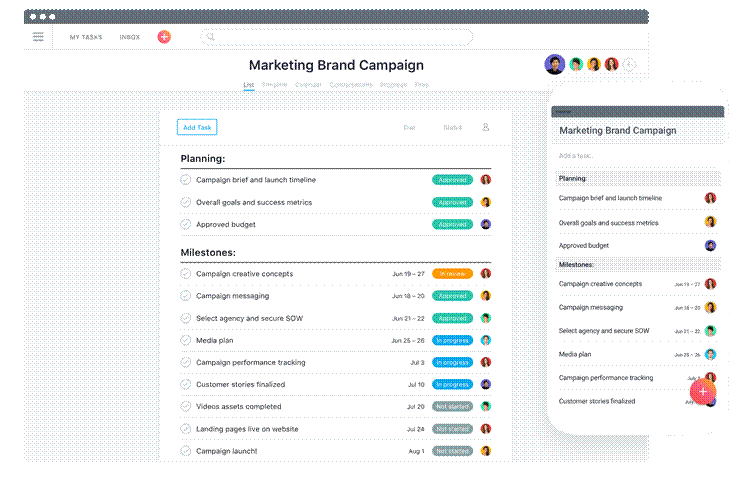
When it comes to project planning and task management, you’ll probably find that Asana is far better than Google Sheets. This free tool allows you to create a project plan and a range of tasks that can be assigned to members of your team.
After each task has been completed, it can be checked off, which gives you a clear viewpoint about the way your project is progressing, and the way each team member is contributing to the success of the project. Team members are also free to attach files and leave comments, which helps boost collaboration and the overall quality of projects.
2. Alternative to Google Docs and Google Drive for Content Management: Filestage
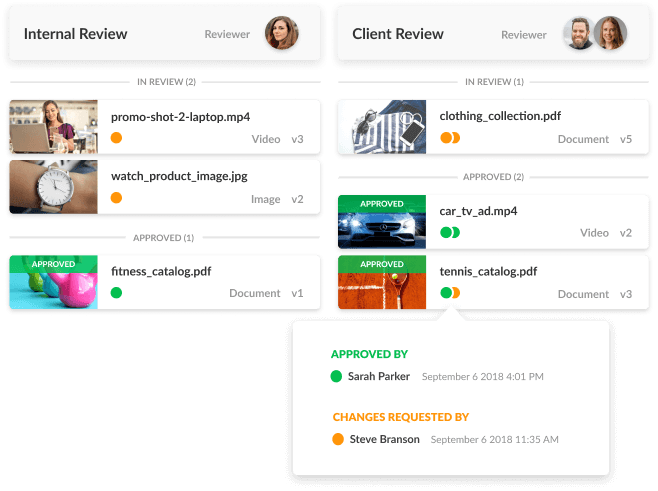
Filestage makes it easy to organize key project content, so the right stakeholders have the right level of access. Version control is simple, and as a project manager, you’re able to coordinate internal and client reviews.
Internal and external stakeholders can easily leave comments and amendments, which helps them accurately share their thoughts and increase the overall quality of the project. It’s easy to see when a project has been approved by the appropriate stakeholders, which gives you a watertight review process from beginning to end.
The tool also provides project managers with regular digest reports, and facilitates the creation of customized workflows.
3. Alternative to Google Chat and Hangouts for Team Collaboration: Slack
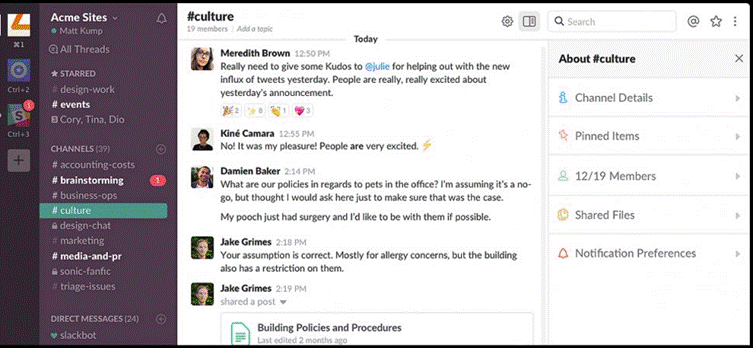
Google has a complicated history with communication apps. While the rest of its suite is packed with potential, this complication is certainly a weak point for the tech giant.
Most companies find that their team naturally gravitates toward alternatives like Skype and Slack, rather than using hangouts. Furthermore, Slack offers powerful functionality and opportunities for efficiency.
If you can maintain well-organized Slack channels for your projects, you’ll find that you and your team can save time by separating conversations into logical threads, which helps prevent confusion and cuts down on the amount of time spent flicking through chats.
4. Alternative to Google Sheets for Productivity Tracking: Hubstaff
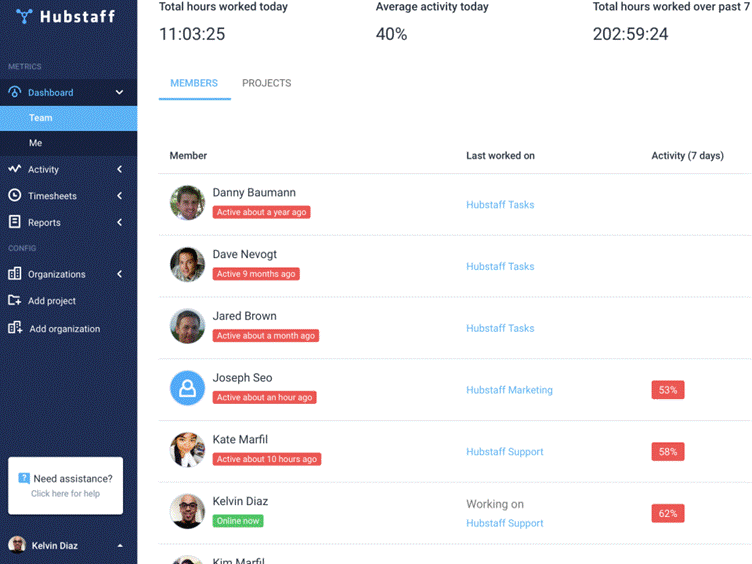
Google does not offer an automatic tracking tool. You may find that manually tracking time in Google Sheets becomes cumbersome and inaccurate, and that many team members will inevitably forget to track their time.
Hubstaff is a simple yet powerful time tracker that automatically generates screenshots and timesheets. By sharing this tracking with your client, you can provide accurate billing that will help you determine the exact profitability of your projects.
This tool also provides information about the activity of your team, which helps you see when people work most effectively and how they’ve recently contributed to the project.
5. Alternative to Google Slides for Reporting & Progress Tracking: Clarizen
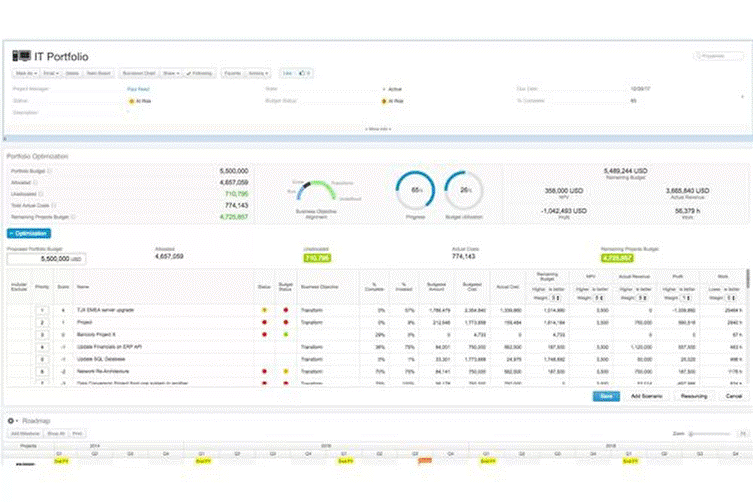
Clarizen is a sophisticated piece of project management software that helps you manage your work, automate processes, and collaborate with a range of stakeholders.
Google Sheets might be able to serve your needs. But in order to achieve the best results, it can demand a lot of manual input that requires the entire team to diligently use it. Clarizen is a feature-rich alternative that’s used by project managers who need to coordinate complex projects that require input from a range of multidisciplinary members.
Conclusion
Google’s suite of project management applications certainly has a place in the arsenal of marketing project managers. These free, powerful tools have a lot to offer, but they aren’t reliable in isolation. So to get the best results, you should use the suite alongside the more specialized, powerful tools above.
Business & Finance Articles on Business 2 Community
(63)

